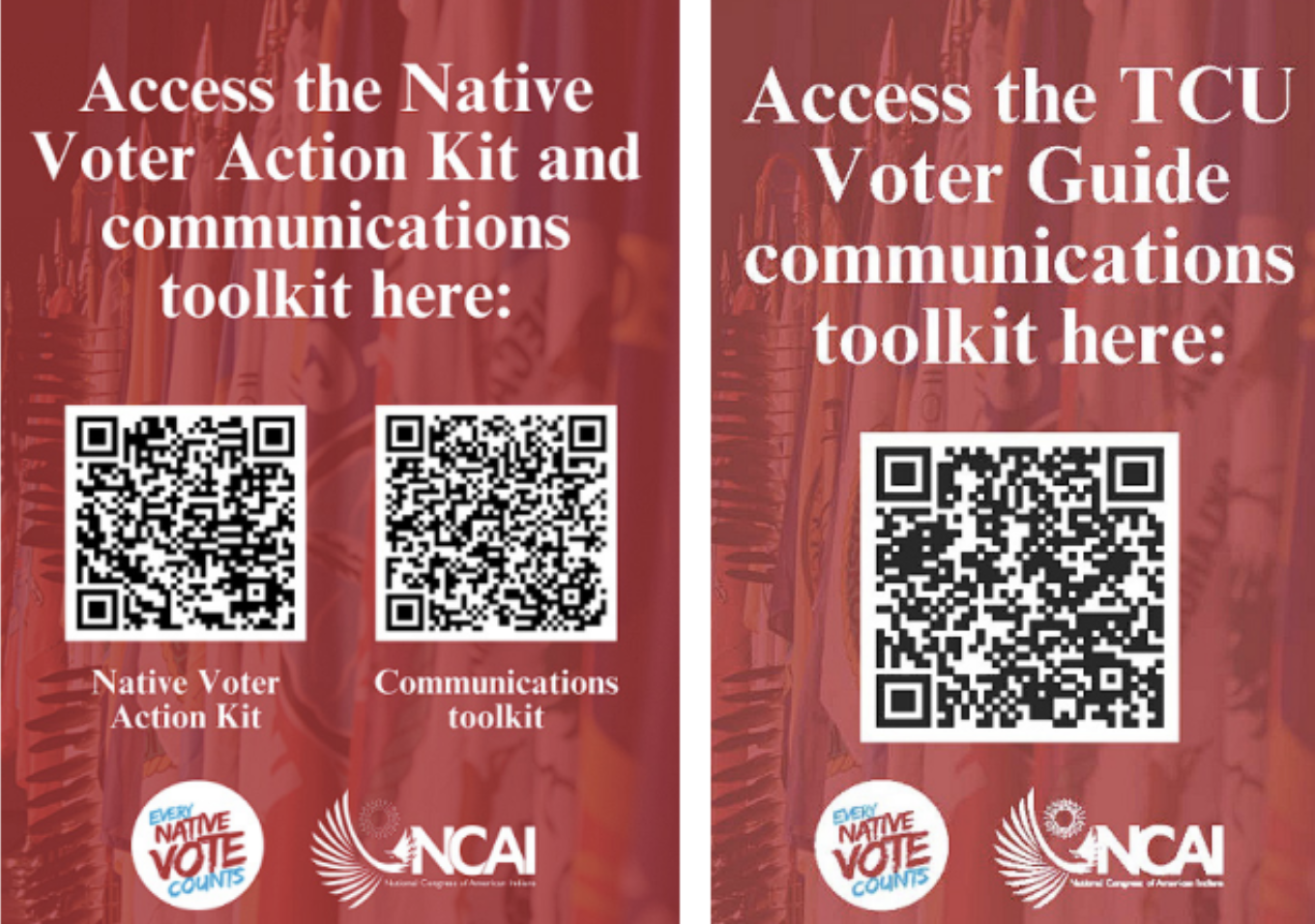NCAI Civic Engagement Building Native Political Power: Organizing, Strategizing, and Mobilizing our Native Electorate
The Native Vote
The National Congress of American Indians (NCAI) Native Vote initiative coordinates and enhances
American Indian and Alaska Native (AI/AN) civic participation through the following strategic approaches: voter registration and Get-Out-The-Native- Vote efforts, election protection, public education, and data collection. This initiative works to add value to the civic power of Indian Country, Tribal Nations, and individual AI/AN people through collaborative civic engagement projects.

While important elections occur annually, 2024 is an especially significant year for civic engagement. NCAI supports Native activists and community organizers doing important voter outreach before the 2024 presidential election. In addition to updating the Native Voter Toolkit, the NativeVote.org website and state information pages have also been updated to include important state-specific deadlines, election information, and voter resources for the 2024 general election.
Not only is 2024 a presidential election year, but it is also the 100th anniversary of the Snyder Act. Also known as the Indian Citizenship Act of 1924, this vital legislation granted legal citizenship to Native peoples in the United States. NCAI and its partners in the Native Vote arena are seizing this opportunity to reflect on this milestone and honor the progress made by Native Vote champions over the past 100 years. This moment serves to ignite the next generation of Native voters to continue strengthening Native political power at every level of government.
After releasing the Tribal Colleges and Universities (TCU) Voter Toolkit last fall, NCAI is excited to continue voter engagement outreach with these institutions and the Native student population. NCAI most recently participated in National Civic Learning Week, bringing toolkits to the American Indian Higher Education Consortium (AIHEC) student convening in Minneapolis, Minnesota, this spring. NCAI looks forward to visiting select TCU campuses to engage in dialogue and workshops with students, including Haskell Indian Nations University (KS), Northwest Indian College (WA), and Southwestern Indian Polytechnic Institute (NM).
As part of the TCU voter toolkit launch, NCAI partnered with the Institute of American Indian Arts (IAIA) to host a student design contest, wherestudents used the power of artwork to illustrate themes of democracy and civic engagement to mobilize the community. The winning design, “Sko Vote Den” by Kami Jo Whiteclay (Apsaalooke/Crow Nation), will be featured on the new NCAI Native Vote merchandise distributed during TCU campus visits.
American Community Survey
Many AI/AN communities face challenges in achieving high completion rates for the American Community Survey (ACS), resulting in reduced funding and representation. NCAI coalition members have requested that successful Get Out the Count strategies be applied to the ACS annually to support Tribal Nations in understanding the basics of the survey, how the data can be used, how to judge the accuracy of ACS estimates, and how to access ACS data on the U.S. Census Bureau’s website. The NCAI Civic Engagement team has developed ACS resources to bolster participation in response to this demand. The NCAI Policy Research Center tested potential messages to encourage more AI/AN individuals to complete the ACS survey upon receiving an invitation from the Census Bureau. The NCAI Civic Engagement team continuously works to uplift communications on basic facts about the ACS. It has developed a one-pager (bit.ly/3QSxhxf) for Tribal Nations and citizens to utilize within their communities. The Census Bureau has also provided an ACS toolkit for general communications about the ACS: bit.ly/3UO1yyG. This collective effort ensures that tribal communities receive the representation and resources they need and deserve, consistent with the federal trust responsibility.
Redistricting
The NCAI Civic Engagement team collaborates with nine national organizations that comprise the Coalition Hub for Advancing Redistricting and Grassroots Engagement (CHARGE). This partnership aims to expand community outreach in Indian Country and support nonpartisan redistricting efforts. NCAI continues to develop redistricting resources for Tribal Nations and citizens for education, outreach, and communication plans. The NCAI team also participates in ongoing webinars designed for both coalition members and tribal leaders, which provide information on the rules of redistricting, organizing communities of interest, preparing and delivering testimony in redistricting hearings, and continuing advocacy beyond legislative hearings, including the map-drawing process.
The NCAI Civic Engagement team’s redistricting reform efforts continue in partnership with Tribal Nations and the CHARGE Hub. The Hub launched a score report card (bit.ly/4arCjI7) designed for individuals and Tribal Nations to provide feedback on improving participation throughout redistricting.
In addition to the CHARGE Hub report, the NCAI Civic Engagement team has partnered with the Tribal Democracy Project in Oregon for a Tribal Nations report on redistricting. The Executive Summary of that report is available here: bit.ly/3wK6Nar. The full report will be made available soon. NCAI will continue to ensure all states are represented in the report.
If you participated in the redistricting work in your state and would like to share your experience or join the coalition, please contact NCAI External Engagement Manager Saundra Mitrovich at smitrovich@ncai.org.
Toolkits






